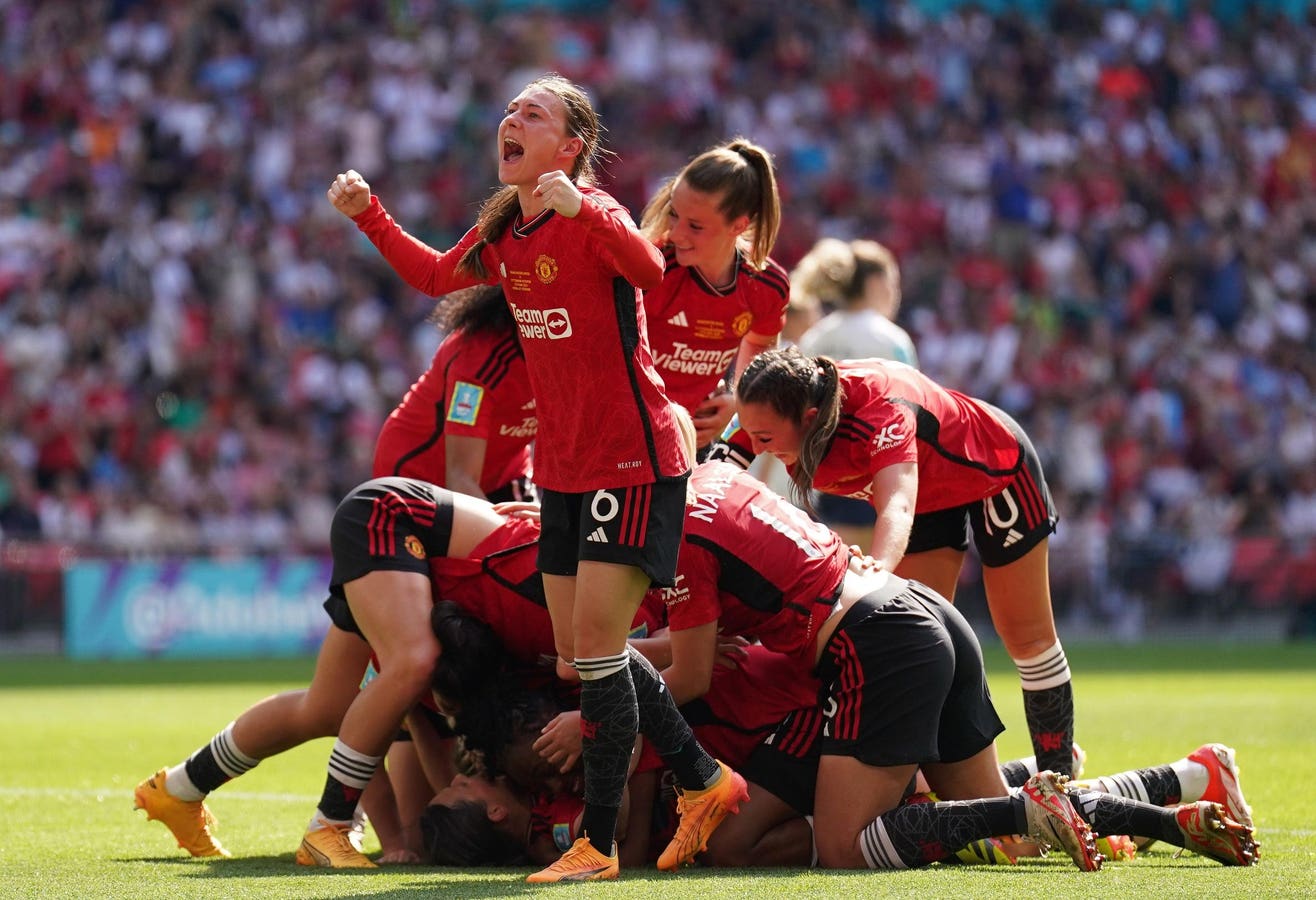Manchester United’s Rachel Williams (bottom) celebrates scoring their side’s second goal of the game … [+]
At a sold-out Wembley Stadium, Manchester United ended a disappointing season by winning their first trophy just six years after their foundation as a professional team.
A stunning goal from Ella Toone in first-half stoppage team gave Manchester United the lead in a game they dominated. Toone – who has made a name for herself scoring at Wembley for England in the final of the UEFA Women’s Euro and Finalissima – did it again on the big occasion.
Picking the ball up in the center circle, she cut right before unleashing a stunning curling shot into the top corner of Becky Spencer’s net. The club’s record goalscorer, it was Toone’s 53rd goal for Manchester United Women’s team.
Manchester United’s English midfielder #07 Ella Toone scores the team’s first goal during the … [+]
Nine minutes into the second half, Rachel Williams, who’s goal in the semi-final brought Manchester United for the second season in succession, scored with another trademark back-post header to double her team’s lead. When Lucía García pounced on a mis-placed Spencer pass three minutes later to score an easy third, the contest was over.
Playing in their first-ever Women’s FA Cup final, Tottenham Hotspur did their best to respond. Midway through the second half, their most expensive player, Beth England hit the crossbar with a header from a left-wing cross. However, 15 minutes from the end, García pounced again in the penalty area to make it 4-0. It was the biggest winning margin in the Women’s FA Cup final since Arsenal defeated Leeds United 5-0 in 2006.
LONDON, ENGLAND – MAY 12: Lucia Garcia of Manchester United (L) celebrates scoring the third goal … [+]
Their victory today means that Manchester United became the first new winner of the Women’s FA Cup – first played in 1971 – since their neighbors Manchester City in 2017. In that final, the defeated finalists were Birmingham City, managed by Marc Skinner. Now the manager of Manchester United, Skinner was on the losing side at Wembley again last season against Chelsea. The 41-year-old has however made it third time lucky in the competition.
Skinner’s three-year contract as head coach at the club expires next month and after two seasons which have seen his side rise from fourth to second in the league, in the process qualifying for the Champions League for the first-time ever, this season has seemingly seen the club take a backward step.
Manchester United went out in Champions League before the lucrative group stage, losing to eventual semi-finalists Paris Saint-Germain in the qualifying round. More damagingly, a record six defeats in the Women’s Super League, including last week to Liverpool, have seen United slump to their worst-ever position of fifth with just one game to play.
Albeit hampered by significant injuries to key players, Skinner has been criticised for his failure to integrate new signings and a lack of flexibility in his team selection. Arguably, Manchester United’s best player this season has been, Grace Clinton, one sent out on loan by Skinner to today’s FA Cup final opponents Tottenham Hotspur. Luckily for Skinner, the terms of the deal meant Clinton was ineligible to play against her parent club.
There has been a gathering storm of unrest among the club’s ardent fans about Skinner’s tactics and player-managament skills. During the 3-1 defeat away to Chelsea in January, a Manchester United supporter held up a banner calling for Skinner to be replaced.
In some ways, Skinner’s position has parallels with the pressure the ultimately legendary Manchester United men’s manager Sir Alex Ferguson found himself in 35 years ago after failing to win a trophy going into his third full season at the club. Then one supporter famously held up a banner saying “3 Years of Excuses and it’s Still Crap. . . Tara Fergie”.
Ferguson ended that season by winning the FA Cup, ushering in a 23-year hegemony of unparalleled dominance over the English game winning 38 trophies. Skinner can only hope that his side can now utilise the full strength of the club’s brand and heritage to assert their authority in the women’s game.
A new winner of the Women’s FA Cup also ended a decade of dominance in the English game by three teams. Since Liverpool won the Women’s Super Leagur title in October 2014, Arsenal (6), Chelsea (15) and Manchester City (8) had between them won every one of the 29 domestic trophies on offer in that ten-year period.
For the second successive year, the Women’s FA Cup final, sold out the 90,000 National Stadium at Wembley. After a record attendance of 77,390 for last year’s final, 76,082 were recorded as going through the turnstiles on a glorious, sun-drenched afternoon in the English capital.





